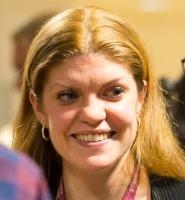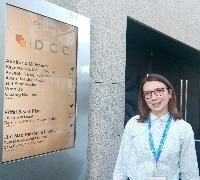Blog
Unless otherwise stated, content is shared under CC-BY-NC Licence
At Your Service?!
So… many of us are offering services around repositories and archives and the data they contain. But the different uses of the term ‘service’ can muddy the water. The UK Data Archive name implies a traditional OAIS-style preservation repository but we’ve always provide additional ‘services’ and through the UK Data Service we belong to a partnership whose name puts a ‘service’ at the heart of the brand. For us these include the archival services of deposit, curation and data publishing, but also extensive support and training.
(Remotely) Connecting the Bits
Connecting the Bits and Digital Preservation Futures are the two most important events on the calendar* which allow our members to let us know about the challenges they are facing, the support they need over the next year and any views they have on the way we do things. Plus, they are good fun and a great excuse to catch up with people we haven't managed to see over the previous 12 months...
*If any members are reading this and are planning on attending, but haven’t signed up yet, registration will close tomorrow!
The EC Vision of our Access and Preservation Mission
On the 25th of April this year (2018) the European Commission released its Recommendation on access to and preservation of scientific information Brussels, 25.4.2018 C(2018) 2375 final (author resists temptation of side-rant on ISO standard date formats). This work by Mariya Gabriel and Carlos Moedas replaces that by Neelie Kroes (then Commission Vice-President) back in 2012. This revision ”recognises that big data and high-performance computing are changing the way research is performed and knowledge is shared, as part of a transition towards a more efficient and responsive open science". This is particularly timely as the UK Data Service is working with international colleagues on the SERISS project to consider the legal, ethical, quality and archival practice implications of 'new and novel' forms of big data.
The paper is not long and it's pretty comprehensible, so you may wish to skip these whimsical musings and got straight to the real thing.
Collaboration in Digital Preservation
In May 2018 I was invited to participate in a workshop entitled ‘The Challenges of Managing Digital Information for Measuring the Sustainable Development Goals’ with a brief to discuss ‘Fostering National and International Collaboration in Preserving and Reusing Digital Information’. This blog post is the manuscript for that presentation. The workshop organisers intend to publish the outcomes of the workshop so the text is presented here as an early draft to encourage comment, criticism or addition.
In this short paper I want to talk about the opportunities and the challenges of collaboration in digital preservation. In particular I will draw on the experience of the Digital Preservation Coalition (DPC), an agency which will be familiar to some of you. I want to reflect on some of the successes we have achieved and barriers we have faced over the years and how we have overcome them, or not as the case may be. I will also project a little to the future, recognising that the collaboration possible through organizations like the DPC cannot be static. I also want to question in a slightly more light-hearted but hopefully insightful way why the DPC is still here and why we have not all been able to get back to our day jobs.
Developing a Membership Model, or: How to review everything you’ve ever done and who you talked to along the way
Dr. Natalie Harrower is the Director of the Digital Repository of Ireland
Major organisational transitions can be challenging, requiring clear goals, and genuine buy-in across the entire organisation. If you think about it, both of these aspects are dialectic and work in concert with each other -- goals can only be attained if they are supported, and support, or buy-in, requires … something clear to buy into.
My first month as a digital archivist
Spring brought more than just a change in season for me this year, as I also made the leap from archives trainee at HSBC to starting a new role as Digital Archivist at the bank. In this post I have been invited to share some of my experiences so far and why I chose to move into the field of digital preservation.
I am starting this role without a background in technology and am still in the very early stages of my career, graduating less than two years ago. I began my career in archives as a trainee at HSBC in London during 2016 and I started my new role as Digital Archivist in March this year. If I was told at my graduation “in 18 months’ time you will be a digital archivist” I probably would have said “I couldn’t do that!” – which is a feeling that I think many archivists grapple with when presented with the challenges of digital preservation.
The things I’m bringing with me
I’m one week into my post as Digital Archivist here at Parliament, so I doubt I’ll be offering any ground-breaking insights just yet! But it’s never too early to jump into the conversation, and I look forward to meeting with and talking to lots of you soon.
This role is an internal move – I’m from an information management background – and as I prepared to move teams, I tried to pack up both the things and the ideas that that I thought would be useful.
My previous team operates with a service-oriented model, delegating a lot of day-to-day records management to a devolved network, and focusses on providing that network with training, advice and support whilst acting as a centre of expertise. I’ve been thinking about what we could learn from this approach in the Digital Preservation team, so here are a newcomer’s ideas about where we could be heading...
What's Going On...
As anyone who has attended one of our ‘Getting Started with Digital Preservation’ workshops will know, I love maturity modelling (and talking at length about why I love maturity modelling…..) Whether you're looking for a light weight tech-focused approach like the NDSA Levels through to something more indepth like the Digital Preservation Capability Maturity Model, there's something out there for you. Why am I such an advocate for this process, you ask? It’s because I believe that if you’re serious about achieving success in any endeavour, and especially in the case of digital preservation, that it is essential to stop every now and then to take a breath and have a critical look at how you’re doing. Maturity modelling is an excellent tool for this, allowing you to benchmark your progress and shape where you want to go next. The information you generate from this process is not only useful for review and planning, but also for activities like advocacy and building a business case.
User access to born-digital archives: first steps for Wellcome Collection
The post was written by Victoria Sloyan, Archivist at the Wellcome Collection
Last November, the Collections Information Team at Wellcome Collection and Dr James Baker from the University of Sussex organised a workshop to bring together researchers and archival professionals to explore methods for providing access to born-digital archives.
Wellcome has been acquiring born-digital records for over a decade. Initially, the focus was on encouraging donations of digital media and getting hold of the material. Once records started to arrive we turned out attention to making sure they were kept safe and adequately preserved. We then began cataloguing in earnest, leading to all kinds of questions being considered about arrangement and description: is there an original order? How will researchers expect to navigate and use born-digital records? To what extent is the metadata embedded in digital files sufficient for research use? Many of our decisions were based on best guesses, recognising that we didn’t fully understand how the catalogue records or the born-digital records themselves would be interrogated and used by researchers.
Notes from IDCC 2018 - Day Two
Day two of IDCC18 explored not only how we can better support data management, but also what we can do with data to meet the aims of our organisations, and finally how we can work together to create more inclusive communities that support innovative solutions. Inclusivity was also the theme of the closing remarks, which revealed that the conference organisers had taken steps to encourage a more even gender balance in the contributing voices. The overall atmosphere of the second day was one of being invited to consider new possibilities, adopt new approaches and contribute to the conversation.























































































































































